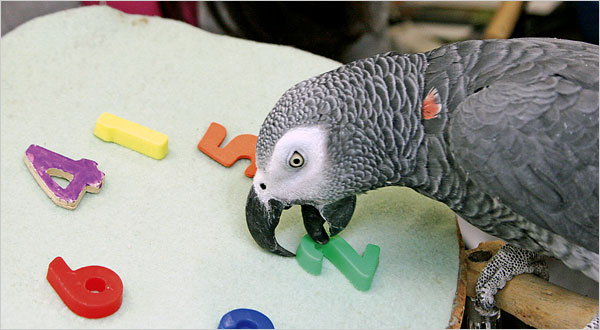
"Thinking about animals"
He was probably already my favorite member of the paper's staff, but a short piece by Verlyn Klinkenborg in today's NYTimes was worth far more than the price of admission. He is writing about Alex, the extraordinary African Grey parrot who died last week ["Brainy Parrot Dies, Emotive to the End"], and this is much of what he concludes, about Alex - and ourselves:
A truly dispassionate observer might argue that most Grey parrots could probably learn what Alex had learned, but only a microscopic minority of humans could have learned what Alex had to teach. Most humans are not truly dispassionate observers. Were too invested in the idea of our superiority to understand what an inferior quality it really is. I always wonder how the experiments would go if they were reversed if, instead of us trying to teach Alex how to use the English language, Alex were to try teaching us to understand the world as it appears to parrots..These are bottomless questions, of course. For us, language is everything because we know ourselves in it. Alexs final words were: I love you.
There is no doubt that Alex had a keen awareness of the situations in which that sentence is appropriate that is, at the end of a message at the end of the day. But to say whether Alex loved the human who taught him, wed have to know if he had a separate conceptual grasp of what love is, which is different from understanding the context in which the word occurs. By any performative standard knowing how to use the word properly Alex loved Dr. Pepperberg [Dr. Irene Pepperberg, Alex's companion and student].
Beyond that, only our intuitions, our sense of who that bird might really be, are useful. And in some ways this is also a judgment we make about loving each other.
To wonder what Alex recognized when he recognized words is also to wonder what humans recognize when we recognize words. It was indeed surprising to realize how quickly Alex could take in words and concepts.
Scientifically speaking, the value of this research lies in its specific details about patterns of learning and cognition. Ethically speaking, the value lies in our surprise, our renewed awareness of how little we allow ourselves to expect from the animals around us
[image by Mike Lovett from NYTimes]